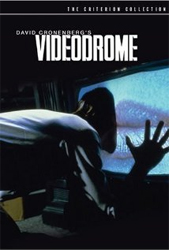
Every single person who visits this site fancies themselves a film fan. From the nameless readers who don’t interact to the regular Chewers on the Boards to every single person on the staff – we love film. We live for it. We watch as much of it as we can. But, sadly, we’ll never be able to see everything. We’ve missed a lot over the years and sometimes we’ll miss one of the big ones. One of the classics or cult favorites that has had everyone talking and proclaiming their love for years. That’s what this column is all about – catching up on those Big Ones. Maybe it’ll get you to rewatch an old favorite you haven’t seen in years, maybe it’ll get you to catch up on your own list of shamefully neglected films. If nothing else, it’ll at least give you an excuse to yell at us for waiting so damn long to see something. So dig it.
Even though I haven’t seen all of his films (quite the opposite, actually), David Cronenberg isn‘t a dude with whom I‘m unfamiliar. Funnily enough though, the handful of his films that I have seen all ended up being chronological, from 1979’s The Brood all the way up through 1988’s Dead Ringers and everything in between.
I can indeed now say “everything,” because I’ve finally gotten around to this…
 Videodrome (1983) – Buy it from CHUD
Videodrome (1983) – Buy it from CHUD
“Please use science responsibly.”
That pretty much seems to be Cronenberg’s mantra, at least in this run of films. Psychotherapy in The Brood. Pharmaceuticals in Scanners. Hell, science in general in The Fly. They’re (on the surface, anyway) all about humanity’s attempts to advance itself as a species and the potentially devastating (and disgusting) side effects of those attempts.
Videodrome, though…well Videodrome is a bit of a different animal. It’s certainly got its roots in science – technology and neurology specifically – but what it seems to be is a bit of a meditation on art and just how damned powerful it really can be.
But before I get into that, a bit of background for those even later to the party than I:
Max Renn (James Woods) is the semi-sleazy GM of a semi-sleazy television station. Focusing his programming on sex and violence, Renn’s aim is to push the envelope and give people what they know (but won’t actually admit) that they want. We see him cynically dismiss softcore porn and cheesy T&A because they’re “too soft” and it’s only when he’s shown a pirate feed of a mystery show called Videodrome that he gets excited. Mainly because of the fact that Videodrome is nothing but a static one-camera shot of various people chained up, tortured and killed. This is what his station needs, this is what his market wants and this is what he devotes himself to tracking down.
And that’s when the weird shit starts.
It’s established early on in the film what’s on Cronenberg’s mind; on a talk show on which he’s a panel guest, Renn is asked if he thinks the things he puts on air are damaging to society. Renn says no and defends himself with answers that are rooted in valid points, but it’s clear that he’s a man without a message – a rebel without a cause, if you will. It’s not something that’s explicitly stated in the text, but once Renn is inflicted with the Videodrome-induced brain tumor it becomes rather obvious that Cronenberg’s answer to the question the talk show host asked is “Um, fuck yeah.”
Well, maybe more precisely, “Um, fuck yeah, BUT…”
And it’s that “but…” that gives the film its weight. On the surface it would seem incredibly hypocritical for Cronenberg to make a film that decries sex and violence when he himself would seem to be one of (legitimate) cinema’s foremost purveyors of both. Videodrome alone is full of it and we won’t even get into Crash (which, admittedly, I still need to actually see, even though I am well aware of what it‘s about). It’s that “but…” that serves as both a warning and a condemnation: sex and violence both have a rightful place in art and both can serve a powerful, important purpose, but that power needs to be used to serve an idea – otherwise it’s poisonous. It’s his fellow filmmakers that he condemns with the Uncle Ben speech and, if I wanted to project a bit, it – in a way – feels like Cronenberg’s declaring the death of exploitation cinema and championing the auteur. Thematically, Videodrome is about the future of media and art. It’s about the evolution of not only the artist but the audience as well and it’s a very clear and concise statement on the responsibilities of both. Ya know, I said earlier it wasn’t explicitly in the text, but that’s actually wrong. There’s a scene where Leslie Carlson’s Barry Convex shoves a bloody, oozing, pulsating cassette into Renn’s giant prosthetic stomach-vagina (holyshit) and it’s here where Cronenberg makes his thesis clear: Art and media are living, breathing organisms and once they’re inside you they will undoubtedly have an effect, so pay attention to what it is that you let in.
Now, all that said, It’s not all metaphorical baubles and thoughtful ruminations on art – it’s also a visual feast; a sticky, psychosexual Cronenberg masterpiece through and through. Renn’s transformation and hallucinations are expertly crafted and executed and, as grotesque as some of the images are, there’s an elegance to them and a sense of awe and wondrous examination that comes through Cronenberg’s lens. It’s not something that’s unique to Videodrome – in all of his “Please Use Science Responsibly” films (fuck it, that’s what I’m gonna call ’em) there’s a genuine curiosity that permeates everything on screen.
Cronenberg is a filmmaker who has very clear opinions and he certainly uses his films to express those opinions, but he also seems to use them as a way to help himself understand humanity. His movies feel as much like observations as they do definitive statements and, in the end, it’s not his eye or his technique that makes his movies special – it’s his curiosity. He’s a filmmaker who is fascinated by what humanity is capable of – both good and bad – and he just simply shows us the possibilities…and a whole hell of a lot of sex and violence.
But it works because it’s art and it has something to say. “Long live the new flesh,” indeed.